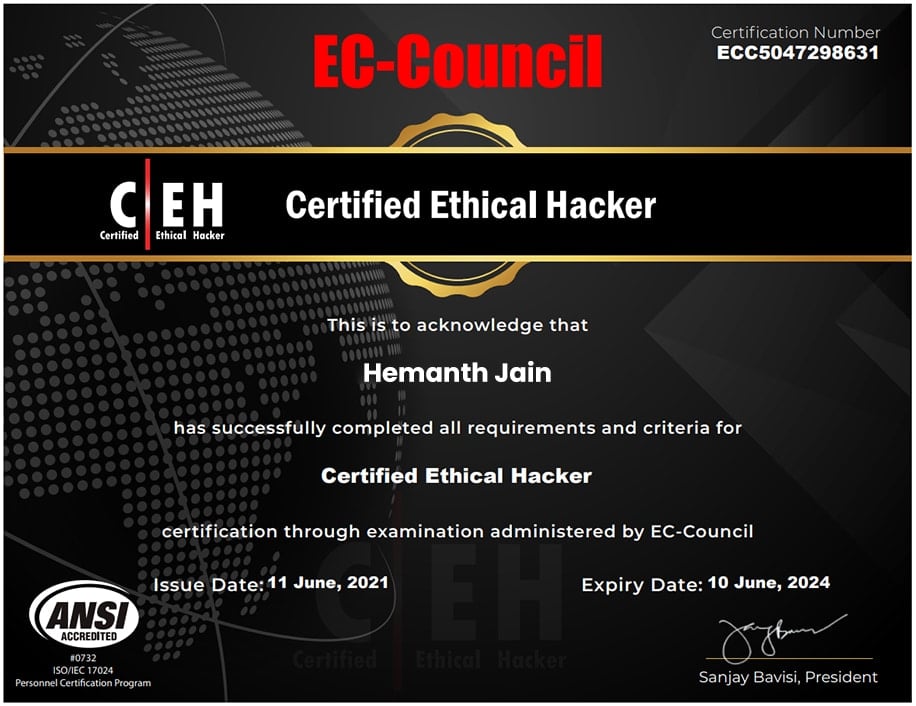Your cart is currently empty.

Watch
Course PreviewThis Ethical Hacking Certification Course is an EC-Council accredited course led by industry experts to assist you in learning from scratch. It covers all essential topics, such as networking, offensive techniques, and defensive practices, to become an ethical hacker.
Absolutely! Our CEH training program is accredited by the prestigious EC-Council, renowned for its rigorous standards and thorough certification programs. This accreditation ensures that our Ethical Hacking Certification meets all the requirements set by the EC-Council, providing a top-notch learning experience to our learners.
This Ethical Hacking Course is a perfect fit if you’re interested in cybersecurity. This CEH course will make you industry-ready. You may start your career as an information security analyst or cybersecurity expert by learning theoretical and practical skills. The comprehensive curriculum covers all the essential aspects of ethical hacking.
The US Bureau of Labor Statistics estimates that the information security domain will grow by 32% over this decade. According to LinkedIn, there are 98000+ job openings for certified ethical hackers in India.
According to Payscale, the average salary of an ethical hacker is INR 7.2LPA, while it can range from INR 5LPA to INR 25LPA. In addition to the salary, individual bug bounty programs organised by MNCs offer USD 5000 to USD 2 million to identify bugs in their portals.
From this CEH Ethical Hacking course, you’ll learn key skills such as footprinting, network scanning, system hacking, malware analysis, social engineering, DoS attacks, web and mobile hacking, cryptography, and cloud security—all aligned with EC-Council CEH v13 standards.
Here are a few benefits that you will get from the EC Council
Talk To Us
We are happy to help you 24/7
60% Average Salary Hike
45 LPA Highest Salary
6000+ Career Transitions
500+ Hiring Partners
Career Transition Handbook
*Past record is no guarantee of future job prospects
Footprinting and Reconnaissance
Scanning Networks
Cloud Enumeration
Vulnerability Analysis
System Hacking
Malware Threats
Sniffing
Social Engineering
Denial-of-service
Session Hijacking
Evading IDS
Firewalls and Honeypots
Hacking Web Servers
IoT Hacking
Cryptography
EMI Starts at
₹5,000
We partnered with financing companies to provide very competitive finance options at 0% interest rate
Financing Partners
![]()
Contact Us
Land Your Dream Job Like Our Alumni

Employers recognise ethical hacking certification as evidence of an individual’s skills, knowledge, and dedication to ethical hacking practices. It opens up various career opportunities in various sectors, including government agencies, financial institutions, and technology companies.
Additionally, the CEH certification requires continuous professional development to maintain its validity, ensuring that certified individuals stay updated with the latest security threats and countermeasures. This commitment to ongoing education enhances the credibility of CEH-certified professionals.
Yes, Intellipaat provides free resources for learners on Ethical Hacking. The major ones are Ethical Hacking Interview Questions, an Ethical Hacking Tutorial, and everything related to Ethical Hacking.
You must pay extra charges of 25000 INR for CEH Exam Voucher for CEH (Certified Ethical Hacker) certification. To help you with the procedure, we advise you to contact our Ethical Hacking course advisor.
You must pay extra charges for CloudLab access in the CEH (Certified Ethical Hacker) certification. To help you with the procedure, we advise you to contact our Ethical Hacking full course advisor.
Our online training program in India at Intellipaat allows you to fully grasp the principles and obtain answers to any questions you may have about ethical hacking courses. Additionally, session recordings are available if you need them later. You can use these recordings to catch up on our CEH certification if you miss any classes.
Yes, the CEH certification can increase your chances of landing a job in cybersecurity! It is a prestigious and well-known accreditation that proves your familiarity with ethical hacking methods and strategies.
The Certified Ethical Hacker (CEH) credential is good for three years from the certification date. The certification needs to be updated every three years, and the two ways to do so are to either pass the most recent exam or obtain 120 Continuing Education Units (CEUs) via the EC-Council Continuing Education program.
The salary options based on the Entry-Level and mid-level job roles in India and US:
Entry-Level:
Mid-Level:
Senior-Level:
Yes, answers can be reviewed before final submission.
The EC-Council has created several important regulations to support the goals of its certification program. These include a detailed security and integrity policy, a dedicated certification agreement, and a non-disclosure agreement (NDA).
Yes, you can enroll in this Ethical Hacking Course even if you do not have a technical background. However, programming knowledge and basic technical terms can help you in the CEH course.
An ethical hacking career might be perfect for you if you:
A candidate who has completed CEH Certification may retake the exam without waiting a certain amount of time if they fail it the first time. However, they must wait 14 days before appearing for the exam for a third attempt. This applies to subsequent retakes as well. It is important to note that a candidate cannot take the same exam more than five times within a year. Furthermore, a 12-month waiting period is required before taking the CEH exam for the sixth time.
The EC Council is the official governing body for information security professionals. The CEH exam was first offered in 2003 by the International Council of E-Commerce Consultants (EC-Council). The Certified Ethical Hacker (CEH) exam is a 4-hour online exam with 125 questions that validates an individual on multiple skills.
Exam vouchers are valid for one year from the date of purchase or course registration. If the exam isn’t scheduled for this year, you must buy a new voucher.
No, once an exam voucher is issued to a learner, it cannot be refunded.
The certification body governs the prices of exams, and these prices are subject to change. Usually, price changes are announced towards the end of the calendar year. If the exam cost rises and your exam is not yet booked, you must pay the extra sum.
A candidate may take the exam five times in a calendar year (12 months). However, if you have already passed that specific exam version, you are not eligible to repeat it.
After completing the exam, candidates can get their exam results within a few minutes. They will also receive a report that contains feedback on how they performed in the exam.
The format of the CEH exam is given below:
CEH Practical Exam
There is an extension of the certified ethical hacker certification exam, the CEH Practical Exam. The format for the CEH Practical Exam is shown below:
20 Practical Challenges
For the Exam Blueprint and Handbook, refer to the EC Council website.
Refunds are not available for EC-Council’s certification and scholarship programs. We recommend thoroughly assessing your eligibility, interest, and the terms and conditions before enrolling in these programs.
Yes, as per our refund policy, once the enrollment is done, no refund is applicable.
















 Click to Zoom
Click to Zoom